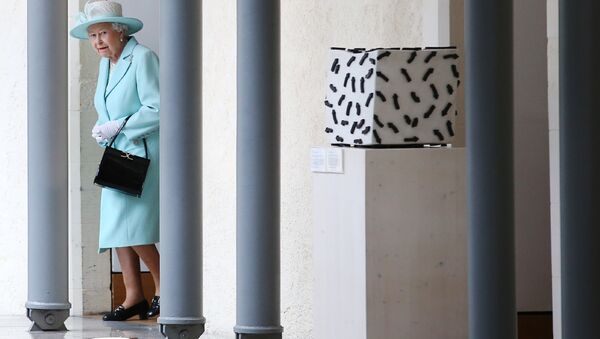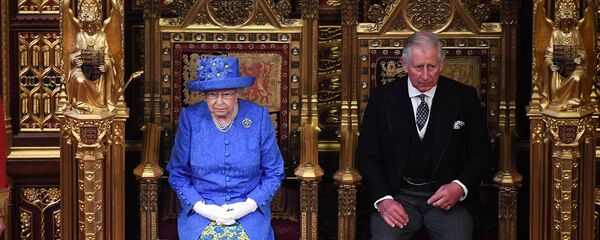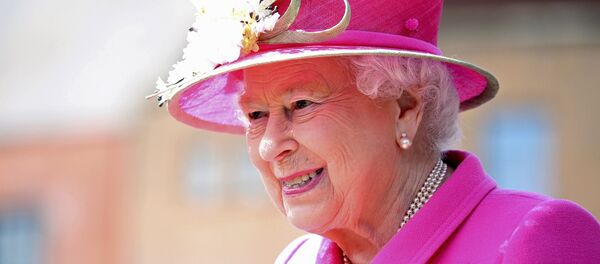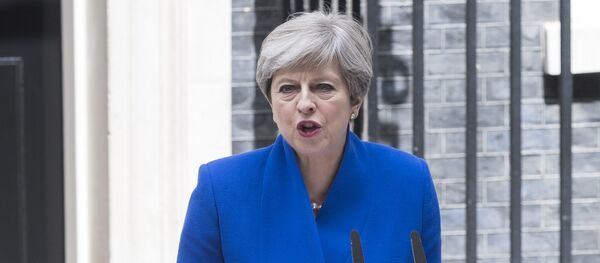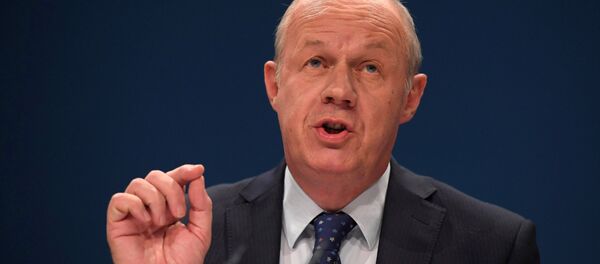LONDON (Sputnik) — The Queen made no sensational announcements, and the key points of the speech were the ones left behind the brackets.
The political program of Prime Minister Theresa May's government is designed for two years, which means the Queen will not deliver a speech in 2018. That is, unless the Conservative Party loses power.
The opposition parties disagreed with such an argument, stating that the Conservatives fear that the next Queen’s speech will not be approved by the parliament and are therefore helping themselves by prolonging the session.
NOT IN THE SPEECH
Many of the measures promised by the Conservatives’ in their election manifesto that turned out to be unpopular among the voters were dropped from the Queen’s speech.
Before the June's snap election, Prime Minister May presented a plan to increase the number of grammar schools that would offer selective education to pupils chosen on the basis of academic merit. The proposal, which was strongly criticized by the opposition, did not make it into the Queen’s speech. May’s promise to bring back foxhunting, a traditional entertainment of the nobility that is condemned by the Labour Party and supporters of environmental protection, was also excluded from the monarch's remarks.
The Queen also said nothing about the visit of US President Donald Trump, who is expected to arrive in the United Kingdom for an official state visit in October.
"Prince Philip and I look forward to welcoming Their Majesties King Felipe and Queen Letizia of Spain on a State Visit in July," the Queen said, without mentioning Trump.
The news of May inviting Trump to visit the United Kingdom was greeted with a wave of objections, as many UK citizens and Members of Parliament condemn Trump’s migration policy.
NEW PROMISES
This year, the Queen’s speech did not bring much news with regard to the new government's policies. Among the promises that could be considered relatively new is the pledge to develop several draft bills in connection to Brexit, including on the issues of migration, sanctions and nuclear security.
"A bill will be introduced to repeal the European Communities Act and provide certainty for individuals and businesses. This will be complemented by legislation to ensure that the United Kingdom makes a success of Brexit, establishing new national policies on immigration, international sanctions, nuclear safeguards, agriculture, and fisheries," the Queen said.
The Queen further announced that the government will prepare legislation aimed at ensuring that "the United Kingdom remains a world leader in new industries, including electric cars and commercial satellites."
Development of the country’s transport network was also on the agenda, with the Queen stating that a new bill will be introduced to "deliver the next phase of high-speed rail."
The UK monarch also spoke about the deadly fire in London's Grenfell Tower, which claimed the lives of at least 79 people last week.
"My government will initiate a full public inquiry into the tragic fire at Grenfell Tower to ascertain the causes, and ensure that the appropriate lessons are learnt. To support victims, my government will take forward measures to introduce an independent public advocate, who will act for bereaved families after a public disaster and support them at public inquests," the Queen stated.
CAREFUL SPEECH
Most of the speech was devoted to confirming the statements already repeatedly made by May and members of government.
The Queen reaffirmed the government's commitment to finding "sustainable political solutions to conflicts across the Middle East," tackling the threat of terrorism and continuing to invest at least 2 percent of GDP in defense, and as such meeting the NATO commitments.
With regard to terrorism, Queen Elizabeth reinforced the government's plan to establish a special commission for countering extremism "in all its forms, both across society and on the internet."
The speech was fairly generic and careful, which is understandable, as, unlike all the previous speeches, there is no guarantee that the political program announced by the Queen will be fully implemented. The fate of the government itself is unclear, as Prime Minister May, whose Conservative Party lost absolute majority in the parliament during the recent general election, is still trying to reach a coalition agreement with the Democratic Unionist Party (DUP) of Northern Island.
May's talks with DUP, initially expected to be completed by the end of the last week, are now unlikely to complete until the next one. The debates over the Queen’s speech in the parliament and he vote on it, scheduled for June 29, will be a test for the new government, with the Labour Party, as well as several other parties, already stating that they will not allow the program to be approved.
THE CROWN AND THE QUEEN
Usually, the State Opening of Parliament is one of the most colorful ceremonies of the year, but today’s speech by the 91-year-old Queen Elizabeth II was unusual not only from a political standpoint, but from a ceremonial one as well.
The Imperial State Crown arrived at the Palace of Westminster on a separate car and remained at a table in the House of Lords during the Queen’s speech.
The Queen was accompanied by her son and heir Charles, the Prince of Wales, as the Queen’s husband Philip, the Duke of Edinburgh, was admitted to a hospital the night before.

